Food Supplement

How do I choose the right sports nutrition supplement for my specific sport or activity ?
When it comes to sports nutrition, supplements can playWhen it comes to sports nutrition, supplements can play performance, recovery, and overall supplements can play a crucial role in enhancing performance, recovery, and overall health. However, with so many options available on the market, it can be challenging to determine which supplement is best suited for your specific sport or activity. Here are some tips to help you make an informed decision: - Identify Your Goals: Before choosing a sports nutrition supplement, it's essential to identify your goals. Are you looking to increase endurance, build muscle, lose weight, or improve recovery? Different supplements are designed to address different needs, so understanding your objectives will help you narrow down your options. - Research the Types of Supplements Available: There are various types of sports nutrition supplements, including protein powders, amino acids, creatine, beta-alanine, and pre-workout formulas. Each type of supplement has its unique benefits and drawbacks, so it's crucial to research each option thoroughly before making a decision. - Consider Your Dietary Needs: Your dietary needs play a significant role in determining which sports nutrition supplement is right for you. For example, if you're following a plant-based diet, you may need to look for vegan-friendly supplements that provide essential nutrients like iron, calcium, and vitamin B12. Additionally, if you have any food allergies or sensitivities, it's important to check the ingredients list of potential supplements to ensure they don't contain any allergens. - Evaluate Brand Reputation and Quality Assurance: Not all sports nutrition supplements are created equal. It's crucial to choose a reputable brand that prioritizes quality assurance and third-party testing. Look for brands that are transparent about their manufacturing processes and ingredient sourcing. Reading customer reviews and seeking recommendations from other athletes or coaches can also help you make an informed decision. - Consult with a Healthcare Professional: Before starting any new supplement regimen, it's always a good idea to consult with a healthcare professional, such as a registered dietitian or sports medicine physician. They can provide personalized advice based on your individual needs and help you avoid potential interactions with medications or existing health conditions. - Start with Small Doses and Monitor Effects: Once you've chosen a sports nutrition supplement, start with small doses and monitor how your body responds. Pay attention to any changes in energy levels, recovery time, or overall performance. If you experience any adverse effects or don't notice any improvements after several weeks, consider trying a different supplement or adjusting your dosage. In conclusion, choosing the right sports nutrition supplement requires careful consideration of your goals, dietary needs, and individual preferences. By researching your options, evaluating brand reputation, consulting with healthcare professionals, and monitoring your body's response, you can find a supplement that supports your specific sport or activity and helps you achieve optimal performance.

Are sports supplements safe for athletes ?
Sports supplements claim to enhance athletic performance, but their safety is a concern. Factors affecting safety include lack of regulation, potential side effects, interactions with other medications, and individual allergies or sensitivities. Athletes should prioritize safety by using well-researched supplements, following recommended dosages, and consulting with healthcare professionals.

How should I choose the right sports supplement for me ?
When selecting a sports supplement, consider your fitness goals, research ingredients, read reviews, consult professionals, and start with a small dose.

What kind of food and nutrition should I provide for my pet to ensure its health ?
To ensure your pet's health, it is crucial to provide the right food and nutrition. Understanding your pet's species-specific dietary requirements, choosing high-quality pet food, supplementing with fresh foods, monitoring your pet's weight and health, and staying informed about pet nutrition research are key aspects to consider. Tailor your pet's diet to their individual needs for a long and healthy life.

What are the most popular sports supplements ?
The most popular sports supplements include protein powders, creatine monohydrate, beta-alanine, caffeine, BCAAs, and multivitamins/minerals. These supplements offer benefits such as muscle growth, increased strength, improved endurance, and faster recovery. However, they should not replace a balanced diet and proper training regimen. Consultation with a healthcare professional is recommended before starting any new supplement regimen.

Is it necessary to take supplements for sports nutrition ?
Supplements for sports nutrition are a controversial topic, with some athletes swearing by them and others considering them unnecessary or even harmful. The necessity of taking such supplements depends on various factors including an individual's diet, training intensity, and specific goals. Sports nutrition supplements come in various forms like pills, powders, bars, and liquids, and include protein supplements, creatine, beta-alanine, caffeine, BCAAs, pre-workout formulas, and post-workout formulas. While a balanced diet can provide most of the nutrients needed for optimal athletic performance, there are certain situations where supplements may be beneficial. These include inadequate nutrient intake from food alone, high-intensity or endurance training, and specific goals or deficiencies. However, there are also potential risks associated with taking sports nutrition supplements, such as overconsumption and imbalanced nutrient intake, contamination and quality concerns, and interactions with medications or other supplements. Therefore, it is essential to choose reputable brands, check for third-party certifications whenever possible, and consult with a healthcare professional before starting any new supplement regimen. In conclusion, whether or not it is necessary to take supplements for sports nutrition depends on individual circumstances. While they can offer benefits for certain athletes and scenarios, they should not replace a well-rounded diet rich in whole foods. Before incorporating any supplements into your routine, consider your specific needs and goals and consult with a qualified healthcare professional or registered dietitian for personalized advice.

What are the best sports supplements for weight loss ?
Sports supplements can aid in weight loss, but they cannot replace a healthy diet and exercise. Protein powder, pre-workout supplements, fat burners, multivitamins, and fish oil are among the best options. However, it's crucial to use these supplements responsibly and consult with a healthcare professional before starting any new regimen.

Are there any side effects of taking sports supplements ?
Sports supplements can enhance athletic performance and support recovery, but potential side effects include digestive issues from protein supplements, dehydration from creatine, increased heart rate from pre-workout stimulants, cardiovascular risks from weight loss supplements, and overdose risks from multivitamins. It is recommended to consult with a healthcare professional before starting any supplement regimen to ensure safety and effectiveness.
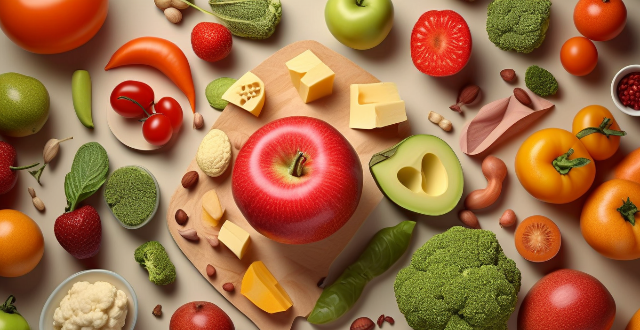
How important is composition in food photography ?
Composition is essential in food photography for creating visually appealing images. Techniques such as focusing on the subject, using negative space, incorporating leading lines, following the rule of thirds, and experimenting with color and contrast can enhance the visual appeal of food photographs.

What is the significance of traceability in the food supply chain for food safety ?
Traceability in the food supply chain is crucial for food safety, enhancing transparency, facilitating recalls, improving quality control, supporting regulatory compliance, enabling better risk management, and promoting sustainable practices.

How are food safety regulations enforced by governments ?
Governments around the world enforce food safety regulations through various methods, including legislation and policy development, inspection and compliance checks, licensing and certification, education and training, penalties and enforcement actions, public communication, and international cooperation. These efforts aim to protect consumers from harmful substances and contaminants in food products while promoting fair trade practices among producers and retailers.

What are the key principles of food safety ?
The text outlines the key principles of food safety, which include cleanliness, avoiding cross-contamination, thorough cooking, proper storage, and using safe water and ingredients. By following these guidelines, individuals can reduce the risk of foodborne illnesses and ensure that their meals are safe for consumption.
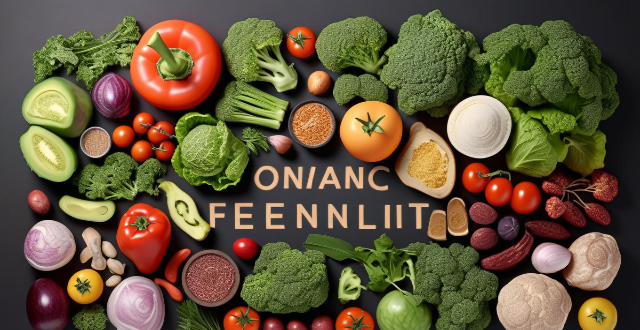
Can eating organic food prevent diseases ?
Eating organic food may offer some potential benefits for disease prevention, such as reduced exposure to pesticides and chemicals, higher antioxidant levels, and better nutrient content. However, the overall evidence supporting its ability to prevent diseases is limited, and other factors influencing disease risk should also be considered when making dietary choices. It is important to prioritize a balanced and varied diet rich in fruits, vegetables, whole grains, lean proteins, and healthy fats while minimizing intake of processed foods and sugary beverages.
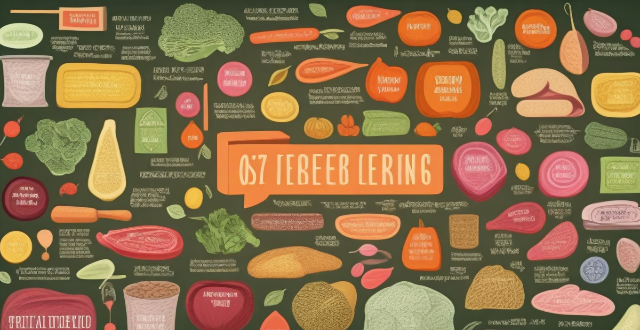
How does food labeling contribute to food safety ?
Food labeling is crucial for food safety as it provides consumers with essential information. It includes ingredient lists, nutritional information, expiration dates, manufacturing details, storage instructions, certification marks, allergy warnings, country of origin, precautionary statements, and environmental impact information. Proper labeling practices help identify ingredients, understand nutritional values, recognize potential risks, and make informed decisions about food consumption.

How does climate change affect agriculture and food security ?
Climate change significantly affects agriculture and food security by increasing extreme weather events, altering crop yields and quality, impacting livestock, and raising concerns about food access, affordability, and biodiversity loss. Adaptation and mitigation strategies such as sustainable farming practices, water management, genetic research, and policy initiatives are essential to build a resilient food system.

How can I reduce food waste in my kitchen ?
To reduce food waste in your kitchen, you can plan meals ahead of shopping, shop smart by making a list and buying fresh produce, store foods properly using airtight containers, understand expiration dates, preserve food through techniques like freezing and dehydrating, get creative with leftovers, practice portion control, and educate yourself on the environmental impact of food waste.

How do street food vendors keep their food safe and hygienic ?
Street food vendors play a crucial role in providing affordable and delicious meals to millions of people worldwide. However, ensuring that their food is safe and hygienic can be challenging due to various factors such as limited space, lack of proper equipment, and unpredictable weather conditions. In this article, we will discuss some effective ways street food vendors can maintain the safety and cleanliness of their food.

Is organic food healthier than non-organic food ?
The debate over whether organic food is healthier than non-organic food has been ongoing for decades. While some argue that organic food offers more nutritional benefits and is better for the environment, others believe that the differences are negligible and that non-organic food can be just as healthy. In this article, we will explore both sides of the argument and try to answer the question: is organic food healthier than non-organic food? Arguments in favor of organic food include nutritional benefits, pesticide reduction, and environmental impact. Organic farming practices focus on building healthy soil and growing strong plants, which results in produce that is richer in nutrients like vitamins, minerals, and antioxidants. Additionally, organic food is grown without the use of synthetic pesticides and fertilizers, reducing the risk of harmful chemicals ending up in our food supply. Finally, organic farming practices promote biodiversity, reduce pollution, and help preserve natural resources. Arguments against organic food include minimal nutritional differences, low pesticide residues, and higher cost. While some studies have found that organic food is more nutritious than non-organic food, other research suggests that the differences are minimal. The levels of pesticides found in non-organic produce are generally well below what is considered safe by regulatory agencies, and washing produce thoroughly can further reduce pesticide residues. However, one of the biggest drawbacks of organic food is its higher cost compared to non-organic options. Ultimately, the decision of whether to choose organic or non-organic food depends on personal preference and individual circumstances. If you prioritize nutrition, reducing your exposure to pesticides, and supporting environmentally friendly farming practices, then organic food may be the way to go. However, if you are concerned about cost or believe that the nutritional differences between organic and non-organic food are minimal, then non-organic options may be suitable for you.

How can consumers check if their food is safe to eat ?
Consumers can check if their food is safe to eat by checking expiration dates, looking for signs of spoilage, reading labels carefully, practicing proper food handling, and using a food safety app.

What are the health benefits of eating street food ?
Eating street food can have several health benefits, including exposure to a wide range of flavors, nutrient-dense options, portion control, and cultural experiences. It's important to choose wisely and prioritize cleanliness and food safety when selecting street food vendors.

What is the difference between natural and organic food ?
Difference Between Natural and Organic Food Natural food is minimally processed with no artificial additives, while organic food follows strict production standards without synthetic pesticides or GMOs. Organic farming promotes soil health and biodiversity, offering potential environmental benefits.

What are the top food festivals around the world ?
Food festivals are a celebration of culinary delights, bringing together food enthusiasts from all walks of life. Here is a list of some of the top food festivals around the world: 1. Tokyo Ramen Festival (Japan) 2. Sziget Festival (Hungary) 3. Salon du Chocolat (France) 4. Taste of Sydney (Australia)

What is the potential of rainwater harvesting as a supplement to traditional water supplies ?
Rainwater harvesting offers environmental, economic, and water security benefits. It reduces runoff and replenishes groundwater. Economically, it saves on utility bills and provides a backup supply. During droughts or emergencies, harvested rainwater is a crucial resource. While generally cleaner than treated municipal water, it may require filtration. Communities can reduce urban heat island effects and raise awareness through rainwater projects. Challenges include legal restrictions and initial costs. Successful implementation requires proper design, maintenance, and pest management.
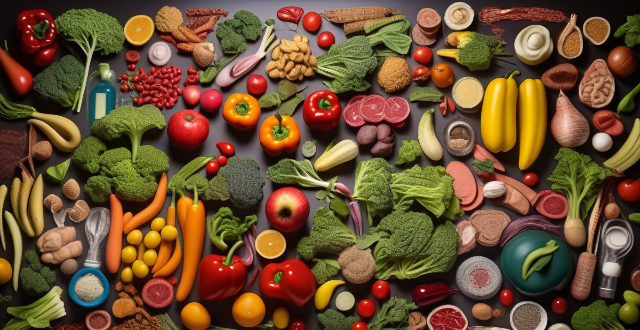
What role do food safety audits play in ensuring food quality ?
Food safety audits play a crucial role in ensuring food quality, identifying potential hazards and risks, ensuring compliance with regulations and standards, and maintaining customer trust. Companies should prepare for audits by reviewing relevant documents, conducting on-site audit activities, and following up with action plans to address any identified issues. By prioritizing food safety audits, companies can build a strong reputation for producing safe and healthy products, leading to increased customer loyalty and sales.

How can I experience a country's culture through its food ?
Experiencing a country's culture through its food is an immersive way to learn about traditions, history, and lifestyle. To do so, one can visit local markets and eateries, take cooking classes from local chefs, join food tours for guided adventures or off-the-beaten-path exploration, and research local cuisine through books, blogs, and online forums. This allows for a deeper understanding of the stories behind dishes, the people who create them, and the environment that nurtures them.

Can sports supplements help with muscle recovery after workouts ?
Can Sports Supplements Help with Muscle Recovery After Workouts? Physical exercise and workouts are essential for maintaining a healthy lifestyle, but they can also lead to muscle fatigue and soreness. Many athletes and fitness enthusiasts turn to sports supplements to aid in muscle recovery after workouts. But do these supplements really work? Let's explore the topic in detail. What are Sports Supplements? Sports supplements are dietary products designed to enhance athletic performance, improve physical health, and support recovery from exercise. They come in various forms, including powders, pills, and liquids, and can be consumed before, during, or after workouts. Types of Sports Supplements - Protein Powders: Help in muscle repair and growth. - Creatine: Boosts energy production in muscles. - Branched-Chain Amino Acids (BCAAs): Support muscle building and recovery. - Glutamine: Aids in muscle recovery and immune function. - Omega-3 Fatty Acids: Reduce inflammation and promote heart health. - Multivitamins/Minerals: Support overall health and wellness. How Do Sports Supplements Help with Muscle Recovery? - Protein Powders: Consuming protein powders after a workout can help replenish depleted amino acids, leading to faster recovery times. - Creatine: Increases the availability of phosphocreatine, which helps regenerate ATP more quickly during high-intensity exercises, reducing muscle fatigue and aiding in recovery. - BCAAs: Consuming BCAA supplements before or during workouts can reduce muscle damage and speed up recovery processes. - Glutamine: Supports muscle recovery by helping maintain cellular volume and preventing muscle breakdown. It also supports immune function, which is important for overall health and recovery. - Omega-3 Fatty Acids: Have anti-inflammatory properties that can help reduce muscle soreness and stiffness after workouts. They also support heart health, which is crucial for athletes who engage in cardiovascular exercises. - Multivitamins/Minerals: While not directly related to muscle recovery, consuming multivitamins or minerals can support overall health and wellness, which indirectly aids in recovery processes. Are Sports Supplements Safe? While sports supplements can be beneficial for some individuals, it's important to note that they are not regulated by the Food and Drug Administration (FDA). This means that their safety and effectiveness may vary between brands and products. It's always best to consult with a healthcare professional before starting any supplement regimen. Additionally, relying solely on supplements without proper nutrition and rest can be counterproductive. A balanced diet, adequate sleep, and proper hydration are still key components of effective muscle recovery.

What are the key elements of a stunning food photograph ?
A stunning food photograph is not just about capturing the visual appeal of the dish, but also about conveying the sensory experience and emotions associated with it. Here are the key elements that can help you create a captivating food photograph: - Composition: Rule of Thirds, Leading Lines, Negative Space - Lighting: Natural Light, Directional Lighting, Soft vs. Hard Light - Color: Color Palette, Saturation, Temperature - Props & Styling: Tableware, Background, Garnishes - Focus & Depth of Field: Tack Sharpness, Bokeh, Layering - Angle & Perspective: Above View, Eye Level, Close-Ups - Post-Processing: Editing Software, Consistency, Detail Enhancement
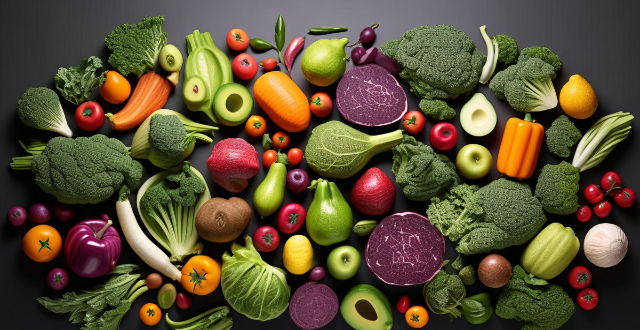
Are there any specific foods or supplements that can help prevent sports injuries ?
There are several foods and supplements that can help prevent sports injuries by promoting overall health and reducing the risk of injury. Foods like fruits, vegetables, whole grains, lean protein sources, and healthy fats provide essential nutrients for building and repairing muscle tissue, supporting immune function, and reducing inflammation. Supplements like vitamin D, calcium, omega-3 fatty acids, glucosamine, and chondroitin can also support bone and joint health and reduce the risk of certain types of injuries. However, it's important to also engage in proper training techniques, warm-up exercises, and wear appropriate protective gear when participating in sports activities.

What are the best food destinations around the world ?
Food is an integral part of any culture, and exploring different cuisines is a great way to experience a country's traditions and customs. Here are some of the best food destinations around the world: 1. Italy - Pizza and Pasta in Naples, Gelato in Florence 2. Japan - Sushi in Tokyo, Ramen in Sapporo 3. France - Croissants in Paris, Baguettes in Lyon 4. Mexico - Tacos in Mexico City, Ceviche in Cancun 5. India - Curry in Mumbai, Chai Tea in Delhi